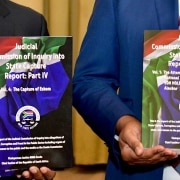|
Getting your Trinity Audio player ready...
|
By Cynthia Schoeman
First published on Ethics Monitor
Our country’s recent history should represent a wonderful story of the triumph of ethics: of what is good and right. After centuries of oppression, South Africa emerged as the rainbow nation, and the peaceful transition to a democracy was heralded as a miracle. The massive moral shift which this transition encompassed should have had an increasing positive outcome, but it’s now 2017 and it hasn’t.
The current political crisis caused by President Zuma’s Cabinet reshuffle is well known. The gravity of the current crisis is exacerbated by the many preceding political dramas, notably the March 2016 Constitutional Court judgment that found the president had failed to uphold, defend and respect the Constitution and the November 2016 Public Protector’s State of Capture report which makes very worrying observations about “alleged improper and unethical conduct by the President… relating to alleged improper relationships and involvement of the Gupta family …”.
The underlying issue in all of these situations is a failure of ethics, and central to this is an abuse of the ‘ethics of power’. The power and authority vested in a leader is ethical when it is used for the benefit of all affected parties and it promotes and protects their development and wellbeing. However, when leadership power is used tor self-enrichment and self-interest and to pursue corrupt ends, it amounts to a gross abuse of power.
The president’s decision to remove a highly effective minister of finance and his deputy reflects the latter – an unethical use of political power. The decision cannot be construed as being in the best interests of the country, its people and its institutions. Standard & Poor’s ratings downgrade two days after the minister’s axing is a stark indication of this.
Instead, as one connects the dots (in the words of Pravin Gordhan), the decision was made to facilitate a path to further personal gain for the president and his associates.
Action is certainly needed. Despite many being inured – almost accustomed – to ethical scandals involving our political leadership, now is not a time to succumb to feeling powerless.
We must recognise that being ethical includes speaking up for what is right via all the platforms we have access to and relative to all those to whom we are connected. Silence never solved breaches of ethics by those in power. Allied to that, it is important to stand together and support each other: “When bad men combine, the good must associate,” wrote Edmond Burke back in the 18th century. In this respect, people should exercise their constitutional right to protest.
In pursuit of building an ethical bulwark for the future, organisations should endeavour to build greater ethical awareness among their employees and stakeholders – but not simply to tell them what’s right and wrong, since they already know this.
Rather the goal should be to build an understanding of the practical application and implications of ethics and its concomitant responsibilities in pursuit of fostering more ethical choices and behaviour. The benefit for the organisation is obvious, not least in terms of a stronger ethical culture. However, the real gain is far greater – employees are able to take that ethics understanding with them wherever they go: to their homes and communities. In other words, organisations can contribute to improving ethics in society.
But for now, owing directly to unethical leadership, our country had slid from the rainbow nation to junk status. However, we must not give up at this stage of our country’s remarkable history to ethical inertia. Now we must remember the strength and resilience of the many social activists who fought for our freedom. Their legacy warrants that we too find the courage and commitment to stand up for what’s ethical, even if it carries a cost. Now is the time to be an ethics activist.
• Cynthia Schoeman is the founder and MD of Ethics Monitor, a company that promotes the proactive management of workplace ethics.







